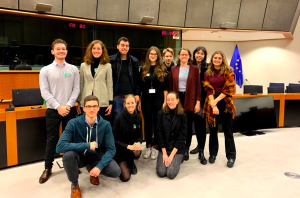A global pandemic has changed the world as we know it and has dramatically transformed our societies. If we were, however, to look on the bright side, the pandemic has also determined more and more of us to better connect with nature and lobby for stronger actions on environmental issues.
At The Good Lobby, we have become fully aware of this and developed a series of advocacy webinars to support Generation Climate Europe in their mission to push for firmer EU policies on climate. The coalition’s attention to community development and environmental activism has allowed GCE to build over time a network of youth-led NGOs at the European level engaged in campaigns and awareness-raising on ecological issues every day.
The first webinar of the series was focused on inspiring and providing GCE participants with a renewed, strategic and hands-on understanding of EU lobbying with real-life examples. The second webinar of the series addressed the insights and practical tools needed to create compelling, evidence-based, legally compliant and solution-driven campaigns.
“The training really offered a new perspective on issues such as preparation, target setting and feasibility of lobby campaigns. Good food for thought on where to start and how to think about our goals and strategies as an organization.” – Valentine, Working Group Volunteer
With these two trainings, The Good Lobby brought its experience in the field of advocacy and representation of the interests of the community through its Senior Fellow, Andrea Boccuni, who helped the participants define the vision and goals of their organizations.
“As with the first session we had with Andrea, very clear, engaging and interesting workshop! Andrea is very accessible and presents very well.” – Timothée Galvaire, Working Group Facilitator
Read about Generation Climate Europe’s journey below.
Generation Climate Europe officially launched in October 2019. The original idea was to connect European youth to the EU institutions, building off the momentum of the strike movements. This was realised as four youth organisations came together to speak with one voice. The first step was to come up with concrete demands and make GCE known to NGOs, the EU institutions and other important stakeholders. We sent out lots of emails explaining who we are and creating connections in Brussels. We weren’t afraid to ask anyone for anything, after all, if you don’t ask, you don’t get. It was amazing to see that there were so many people and organisations who wanted to support the work of young people. It was important to make sure that as many people as possible knew about us, what we were doing and what our needs were.

Once we had created a space for ourselves and had built up good connections, we began to expand on our work by creating working groups and recruiting volunteers. We wanted to create a platform where young people could directly lobby the EU and make a difference on issues that matter to them. We thought about the working groups as a space to develop skills and knowledge. To this day, GCE’s working groups have gathered over 100 volunteers who play a crucial role in GCE’s advocacy.
Over the past year, we have had a number of key achievements. We published an Op-ed in Euractiv, calling for a truly green recovery fund, in line with the ambitions of the European Green Deal. In July 2020 we organised the first-ever EU Presidency Youth Dialogue with the German Environment Minister, Svenja Schulze, gathering over 100 young people from 70 countries. We have also had meetings with a number of high-level officials at the European Commission, most recently a roundtable with Frans Timmermans, strike movements and other youth organisations. By doing this, we aim to amplify the voice of youth and make sure that we are creating spaces which anyone can participate in.
However, we have also faced a number of challenges along the way. Among them, finding a structure that works for GCE has been a constant challenge. There was a lot of trial and error in this process, finding out what worked and spending time brainstorming on what our needs and priorities were so that we could create efficient processes. Having such a large number of volunteers and only a small secretariat, volunteer management was also something we confronted with. In particular with all the remote work due to current circumstances, it was difficult to create a sense of community within GCE. We also faced more direct obstacles related to lobbying. Once we had created connections and spaces for young people, the challenge now was to formulate our demands effectively and efficiently. Advocacy was an area which we had little understanding of. This was where our connections really paid off, particularly with The Good Lobby. Having access to experts who have been doing this for years professionally accelerated our progress and meant that we could develop focused and efficient strategies and goals.